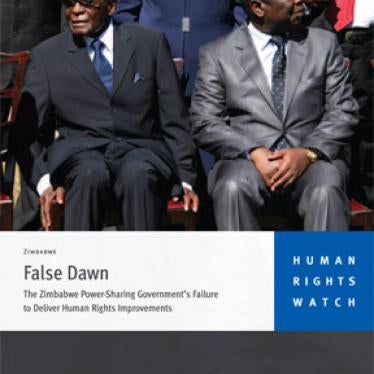(New York) - The European Union should maintain its travel restrictions and asset freezes on President Robert Mugabe and his inner circle until Zimbabwe carries out the concrete human rights reforms set out in the 2008 Global Political Agreement, Human Rights Watch said today. The EU is currently reviewing its sanctions policy toward Zimbabwe.
The Agreement, which established a power-sharing government, was implemented in February 2009 by Mugabe's party, the Zimbabwe African National Union-Patriotic Front (ZANU-PF), and the then-opposition Movement for Democratic Change (MDC) led by Morgan Tsvangirai. It contained specific measures to promote freedom of speech and the rule of law, end politically motivated violence, and apply laws of the country fully and impartially in bringing to justice all perpetrators of politically motivated violence. But the repression has continued, and the perpetrators are not being held to account for their actions.
"ZANU-PF has continued committing grave human rights abuses and acting as if the agreement had never been signed," said Georgette Gagnon, Africa director at Human Rights Watch. "The European Union runs the risk of reinforcing ongoing repression and impunity in Zimbabwe if it eases the sanctions now."
In September, the European Union sent a delegation to Zimbabwe to assess the implementation of the Agreement. The delegation found that the inclusive government had failed to meet the benchmarks the EU had established for resuming development cooperation with Zimbabwe and lifting targeted travel and financial restrictions on senior ZANU-PF members. The Swedish minister for international development, Gunilla Carlsson, who was part of the EU delegation, said then that targeted sanctions against Zimbabwe would not be lifted until human rights abuses ended.
Human Rights Watch's ongoing research and analysis in Zimbabwe show that the human rights situation there remains virtually the same as during the EU delegation's visit. As Human Rights Watch said in an August report on Zimbabwe's new power-sharing government, state agents affiliated with ZANU-PF continue to abduct and kill MDC activists without punishment and to arrest its legislators on spurious charges. Zimbabwe's oppressive media laws remain unchanged. Illegal invasions of commercial farms, frequently led by military personnel allied with ZANU-PF, are continuing; and there has been no meaningful progress in instituting promised human rights reforms or in demonstrating respect for the rule of law.
Some government-owned companies subject to EU sanctions, like Zimbabwe Mining Development Corporation (ZMDC), are also actively involved in mining diamonds in eastern Zimbabwe, where Human Rights Watch has uncovered rampant abuses by the armed forces, including forced labor, child labor, killings, beatings, smuggling, and corruption. These abuses continue and justify the need to maintain pressure on ZANU-PF to honor its signed commitment to reform, Human Rights Watch said.
The European Union in 2002 began imposing travel restrictions and asset freezes on Mugabe and about 200 senior ZANU-PF officials, as well as on some state-owned companies with close ties to the party. The first round of sanctions followed Mugabe's controversial re-election that year, a breakdown of the rule of law, systemic human rights violations, and chaotic and often violent land seizures.
"Some in Europe might believe that making concessions is the way to get ZANU-PF to moderate its behavior, but ZANU-PF has shown that it would only take this as a sign of weakness and dig in its heels even further," Gagnon said. "The European Union should insist before it takes any action that ZANU-PF makes the concrete and irreversible improvements in human rights and the rule of law that it agreed to."






